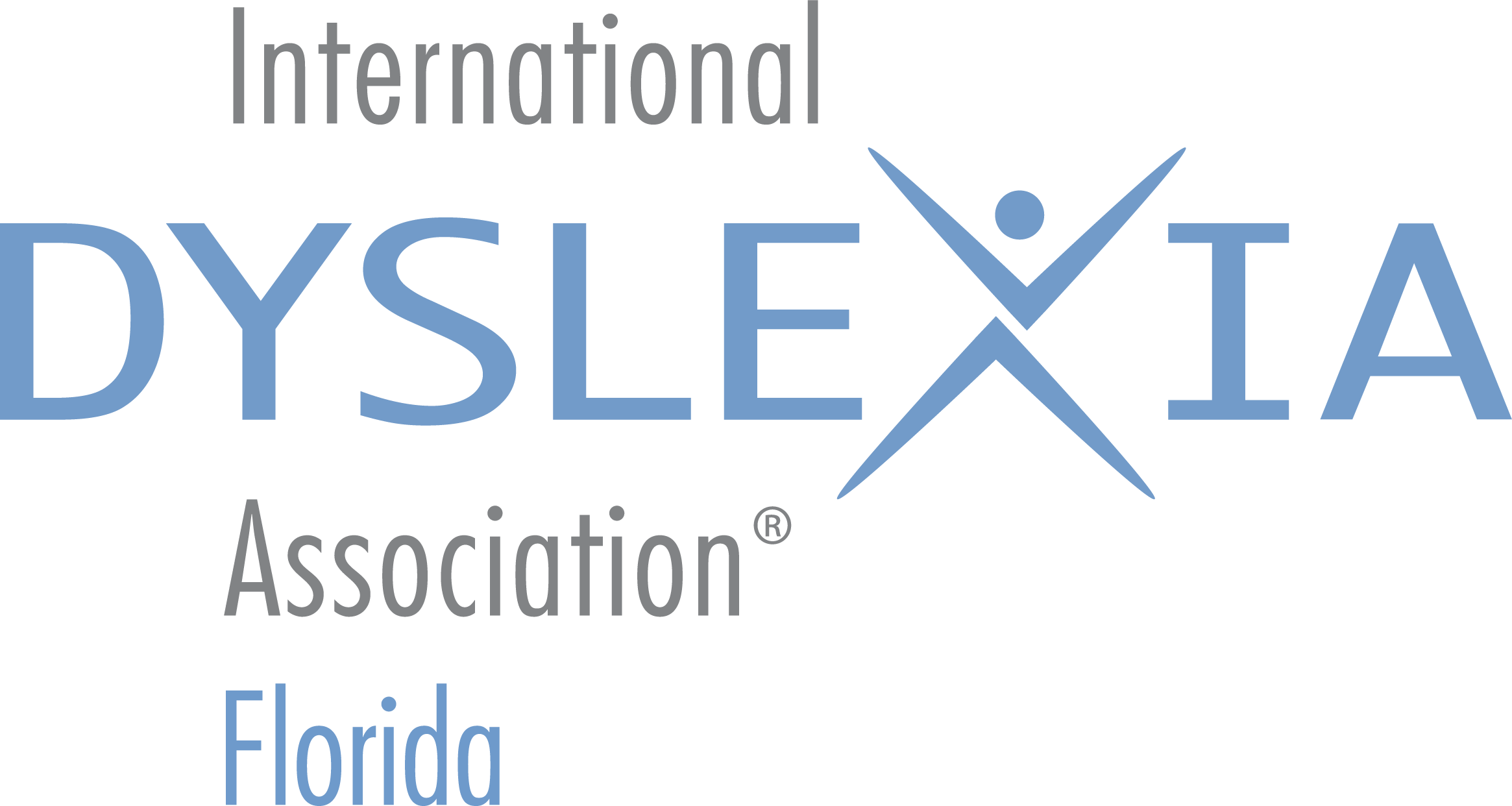Session and Speaker Details
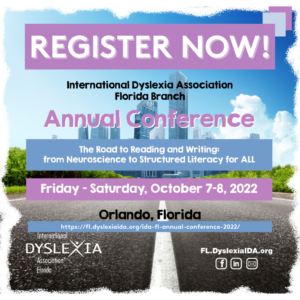 |
The Road to Reading and Writing: From Neuroscience to Structured Literacy for ALL |
Breakout Sessions on Friday, October 7
Concurrent Session A (1:00-2:30 PM)
“The Benefits of Using a Sound Wall for ALL Students”
Mary Dahlgren, Ed.D.
Using a sound wall in your classroom can transform instruction. Because of the science of reading, we are becoming more aware of the role of phonetics and phonology in beginning reading and spelling. While learning to speak happens long before learning to read, teaching how speech maps to print has not always been a part of general classroom instruction. Developing phonemic awareness to a prescribed level must happen prior to the development of automatic sight word reading. Explicitly teaching the sounds, how they are produced in the mouth, attending to what is happening with your tongue, teeth and lips and the flow of air makes learning more concrete. We will examine the 44 speech sounds, how to introduce them and build a sound wall with consonants and vowel phonemes and discuss strategies for engagement as part of daily practice. These are some of the stepping stones to orthographic mapping so all students can become fluent and proficient readers.
After the session, participants will be able to:
- define phonetics, phonology, phonemic awareness, phonemes, consonants, vowels;
- explain the importance of teaching phonemes for 44 sounds explicitly;
- demonstrate how to explicitly teach consonant and vowel phonemes using strategies, including a sound wall; and
- recognize this instruction supports orthographic mapping and its relationship to fluency and reading proficiency.
Primary KPS Aligned with Training: 4B.4 Secondary KPS Aligned with Training: 4B.6
2.0 – Continuing Education Units (Post Test and/or Evaluation Required)
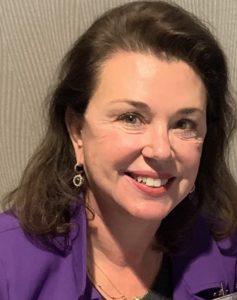 Mary Ellis Dahlgren, Ed.D., is founder and President of Tools 4 Reading. She is an experienced educator with over 25 years in the field of education having served as a dyslexia therapist, elementary classroom teacher, international literacy consultant and author. She is the author of a highly successful phonics tool kit which includes Kid Lips and Phoneme-Grapheme Instructional Cards for elementary, special education, and English language learner teachers. She served as a National Trainer for the distinguished teacher curriculum Language Essentials for Teachers of Reading and Spelling (LETRS) for 18 years. She is the former Executive Director of Payne Education Center, a nonprofit teacher training center in Oklahoma. The Center was established to provide teacher training for teachers of dyslexic students and to support parents of dyslexic children. She is also the President of The Reading League Oklahoma Chapter. Mary’s passion is to help everyone involved in reading instruction to feel equipped and confident in providing the highest quality instruction possible.
Mary Ellis Dahlgren, Ed.D., is founder and President of Tools 4 Reading. She is an experienced educator with over 25 years in the field of education having served as a dyslexia therapist, elementary classroom teacher, international literacy consultant and author. She is the author of a highly successful phonics tool kit which includes Kid Lips and Phoneme-Grapheme Instructional Cards for elementary, special education, and English language learner teachers. She served as a National Trainer for the distinguished teacher curriculum Language Essentials for Teachers of Reading and Spelling (LETRS) for 18 years. She is the former Executive Director of Payne Education Center, a nonprofit teacher training center in Oklahoma. The Center was established to provide teacher training for teachers of dyslexic students and to support parents of dyslexic children. She is also the President of The Reading League Oklahoma Chapter. Mary’s passion is to help everyone involved in reading instruction to feel equipped and confident in providing the highest quality instruction possible.
Concurrent Session B (1:00-2:30 PM)
“The Challenges of Dyslexia: How Does It Feel? An Experience”
Facilitator: Milaura Spelman, MS-CCC/SLP, IDA-FL Secretary
Individuals with dyslexia experience a constellation of symptoms that include unexpected difficulties with reading, spelling, and writing. These symptoms can make it difficult for a child to complete academic classwork, and can make it difficult for an adult to complete certain work related activities. In this session, attendees will participate in activities to understand the challenges that people with dyslexia may face. Included will be activities related to reading, writing, and spelling. Attendees will also learn evidence based facts about dyslexia and suggestions for accommodations in the classroom.
After the session, participants will:
- describe why reading aloud in a group is anxiety provoking for individuals with dyslexia;
- describe why individuals with dyslexia may self-edit their writing even when they want to write more;
- list three “myths” about dyslexia and will provide evidence-based facts to refute those myths.
Primary KPS Aligned with Training: 1.7 Secondary KPS Aligned with Training: 2.4
1.5 – Continuing Education Units (Post Test and/or Evaluation Required)
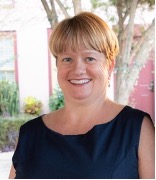 Milaura Spelman is a speech/language pathologist and a reading specialist, with over 20 years of experience working with children. She holds the ASHA certification and Florida licensure. She is an instructor in the Early Childhood Education program and the Communication Disorders program at the University of Central Florida. She is a Wilson Reading instructor, and has completed Orton-Gillingham and Spell-Links education. These types of “Structured Literacy” methods are used for children that demonstrate reading and spelling deficits due to orthographic processing or phonological processing deficits-often our children with dyslexia.
Milaura Spelman is a speech/language pathologist and a reading specialist, with over 20 years of experience working with children. She holds the ASHA certification and Florida licensure. She is an instructor in the Early Childhood Education program and the Communication Disorders program at the University of Central Florida. She is a Wilson Reading instructor, and has completed Orton-Gillingham and Spell-Links education. These types of “Structured Literacy” methods are used for children that demonstrate reading and spelling deficits due to orthographic processing or phonological processing deficits-often our children with dyslexia.
Concurrent Session C (3:00-4:30 PM)
“Dyslexia and the Mental Health Landscape”
Kimberly Beaman Rios, M.A., LMHC
Join us to learn and explore the often hidden challenges and joys that people with dyslexia experience in their individual journey. We will discuss society’s influence and common misinformation about dyslexia. Together we will embark on a journey to explore the mental health landscape, taking a closer look at the cyclical role of trauma and grief. The overall goal is for participants to walk away with a stronger understanding of the impact of dyslexia when combined with mental health challenges and societal barriers. My hope is that professionals in the field along with those identified as dyslexic will reflect upon their own healing journey or how to best support those in need of healing.
After the session, participants will be able to:
- discuss how dyslexia is defined. Each individual is unique and not defined by their dis-ablity, rather each person has abilities, many of which may be unknown or unseen;
- learn about the social model, medical model and various models on “disability” as related to dyslexia and mental health;
- learn how you can make the educational and therapeutic learning environment more accessible for an individual with dyslexia;
- understanding how trauma, grief, depression and anxiety impact a person with dyslexia;
- discuss the cycle of emotional healing from trauma as it relates to dyslexia; and
- discuss the gifts, talents, strengths and common mental health goals/ successes of individuals with dyslexia.
Primary KPS Aligned with Training: 2.1 Secondary KPS Aligned with Training: 2.3
2.0 – Continuing Education Units (Post Test and/or Evaluation Required)
 Kimberly Beaman Rios is President of Accessible Books for Children, LLC and the author of the book My Little Cupcake, which she will have available for purchase and for signing after her presentation. Kimberly is an active member of Decoding Dyslexia-Florida and advocates for children with Dyslexia. Kimberly is a creative entrepreneur in the fields of writing, acting, and music. Her passion is to connect with others using her intuition and imagination to create a ripple effect of artistry.
Kimberly Beaman Rios is President of Accessible Books for Children, LLC and the author of the book My Little Cupcake, which she will have available for purchase and for signing after her presentation. Kimberly is an active member of Decoding Dyslexia-Florida and advocates for children with Dyslexia. Kimberly is a creative entrepreneur in the fields of writing, acting, and music. Her passion is to connect with others using her intuition and imagination to create a ripple effect of artistry.
Concurrent Session D (3:00-4:30 PM)
“Letters and Sounds: Establishing the Foundation for Reading”
Brenda Larson, M.Ed. and Shelina Rajani-Shankar, M.Ed. OGC-PA
This presentation will focus on best practice techniques for teaching the alphabetic principle, including: a rationale for emphasizing lower case letters and letter sounds, an overview of Logical Letter Formations, a systematic order of presentation of letters, and many ‘tips’ for teaching letter sounds and proper formations.
After the session, participants will be able to:
- teach letter sounds so children retain concepts in long-term memory;
- understand the importance of focusing on lower case letters and letter sounds;
- teach learners to form letters neatly and properly using a systematic order of presentation of letters; and
- increase students’ accuracy and automaticity of letter sound recognition and blending skills.
Primary KPS Aligned with Training: 4B.1 Secondary KPS Aligned with Training: 4A.1
2.0 – Continuing Education Units (Post Test and/or Evaluation Required)
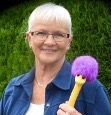
Brenda Larson (B.Ed. 1971, UBC; M.Ed. 1979, Gonzaga U) retired in June 2006 after 34 years as a Learning Assistance teacher in the BC public school system. Her role included direct instruction with struggling regular education students, ELL, Enrichment/Gifted, classroom support, liaison with district staff and consultation with classroom teachers, parents, and support personnel. Her experience working with at-risk students led her to develop Itchy’s Alphabet program, a systematic, explicit, and practical approach to introducing letter sounds and formations. Brenda expanded the Itchy’s Alphabet line to include early literacy resources in French and Spanish. Most recently, Brenda sold her business to Shelina Rajani-Shankar. She is supporting Shelina with the transition to continue her legacy of supporting student success.

Shelina Rajani-Shankar (M.Ed. ’03, UBC; OG Canada Literacy/Math Certification, 2021) has been an elementary school teacher for the past 22 years in the BC Public School System. She has taught K-7 as a classroom teacher and has dedicated the majority of her teaching career working as a Learning Assistance, ELL and Integration Support Teacher. Her role has included classroom support, district support and liaising with district staff, consultation with parents, support personnel and outside agencies to bring about the best possible outcomes for success for students with special needs and at-risk students. Shelina has a passion for supporting professional development and believes in lifelong learning. She has been a sessional instructor at UBC and has taught Special Education Courses to students in the B.Ed. Program at UBC. Recently, she has become the new owner of Itchy’s Alphabet, and hopes to continue Brenda’s legacy of supporting professional development centered around best practice for supporting the development of early foundational literacy skills.
General Keynote Sessions on Saturday, October 8
Keynote Session (9:00-10:00 AM)
“Empowerment of Students with Dyslexia”
Jared S. Blank, MBA
Growing up with dyslexia helped Jared see how challenges can become opportunities. This presentation is designed to help move students, parents, and educators to see that as well. Jared takes participants through a snapshot of his life and breaks down how those learnings and early frustrations helped him overcome challenges in life whether inside or outside the classroom.
After the session, participants will be able to:
- understand how dyslexia impacts students;
- understand how dyslexia and learning differences can be the root cause of other problems we see in our society;
- recognize and value the importance of an individual’s passions; and
- find ways to focus on those passions to help guide students to success.
Primary KPS Aligned with Training: 2.3, 2.4, 2.5 Secondary KPS Aligned with Training: 5.1
1.00 – Continuing Education Units (Post Test and/or Evaluation Required)
 Jared Blank is a third generation Portland native, an extreme runner, motivational speaker, sports, trainer, dyslexia advocate, and author of Running the Distance – his story of how dyslexia prepared him for life and for completing one of the most brutal races in the world. Jared was diagnosed with dyslexia at age 5, long before there was any help in the classroom. Fortunately, a combination of Jared’s will to succeed and his parents’ unending support resulted in Jared thriving academically and in life. In 2017, he decided to leave his career in collegiate football to use running as a platform for raising awareness and funds to help students just like him. Jared knows the hardships students with learning challenges face and wants to support future students in his home state. He believes that starts with K-3 literacy. Science-based reading and equity need to be at the forefront of our education system.
Jared Blank is a third generation Portland native, an extreme runner, motivational speaker, sports, trainer, dyslexia advocate, and author of Running the Distance – his story of how dyslexia prepared him for life and for completing one of the most brutal races in the world. Jared was diagnosed with dyslexia at age 5, long before there was any help in the classroom. Fortunately, a combination of Jared’s will to succeed and his parents’ unending support resulted in Jared thriving academically and in life. In 2017, he decided to leave his career in collegiate football to use running as a platform for raising awareness and funds to help students just like him. Jared knows the hardships students with learning challenges face and wants to support future students in his home state. He believes that starts with K-3 literacy. Science-based reading and equity need to be at the forefront of our education system.
Book Signing in the Exhibit Hall!Grab a copy of Running the Distance from the International Dyslexia Association bookstore. All profits from book sales are 100% donated to the International Dyslexia Association. Keep paying it forward! |
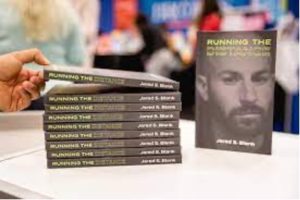 |
Keynote Session (10:30 AM-12:00 PM)
“Delivering on the Promise of Literacy for All: Yes, We Can!”
Laura Stewart
Teaching children to read is the most pressing educational endeavor of our time. All children deserve equitable access to high-quality, evidence-aligned instruction. Without that instruction, many students will fall through the cracks, diminishing their potential to lead rich literate lives. More is known about how to teach reading than ever before, yet oftentimes this evidence base is not provided to teachers nor translated to practice. This session addresses this compelling call to action by addressing these big ideas: 1. Learning to read is not a natural skill and therefore instruction really counts; 2. There are key conceptual models and neuroscientific evidence which can inform our understanding of the process of reading so that instruction can be effectively delivered and assessed, with targeted instruction as indicated; and 3. There are essential “must-haves” for educational leaders to embrace in order to support the school community in delivering on the promise. This is a no-blame, no-shame zone. We are all in this together, supporting one another in realizing our greatest hope, that all children will learn to read.
After the session, participants will be able to:
- explain why reading is not natural and why instruction really matters;
- identify the domains of the Simple View of Reading and subskills of skilled reading as illustrated in Scarborough’s Rope; and
- cite five (5) essential evidence-aligned “must haves” for effective instruction.
Primary KPS Aligned with Training: 1.2 Secondary KPS Aligned with Training: 1.6
2.00 – Continuing Education Units (Post Test and/or Evaluation Required)
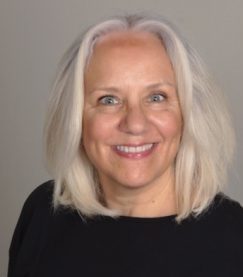 Laura Stewart is an educator and organizational leader. She has served as a classroom teacher, building and district administrator, adjunct professor, and director of numerous professional development initiatives around the country. Laura Stewart is currently the Chief Academic Officer at 95 Percent Group. She has also served as the National Director of The Reading League, the Vice President of Professional Development for the Rowland Reading Foundation, and the Chief Academic Officer for Professional Development at Highlights
Laura Stewart is an educator and organizational leader. She has served as a classroom teacher, building and district administrator, adjunct professor, and director of numerous professional development initiatives around the country. Laura Stewart is currently the Chief Academic Officer at 95 Percent Group. She has also served as the National Director of The Reading League, the Vice President of Professional Development for the Rowland Reading Foundation, and the Chief Academic Officer for Professional Development at Highlights for Children. Laura presents nationally and internationally and has written for numerous organizations and publications, including co-authoring The Everything Guide to Informational Text K-2; Best Texts, Best Practices. She is the host of the podcast “Teaching, Reading, and Learning: The TRL Podcast.” Laura serves on several advisory boards, including the International Foundation of Effective Reading Instruction. Laura is a certified LETRS (Language Essentials for Teachers of Reading and Spelling) trainer. Laura’s passion is empowering educators to positively impact ALL students and ultimately change the course of literacy achievement in this country.
for Children. Laura presents nationally and internationally and has written for numerous organizations and publications, including co-authoring The Everything Guide to Informational Text K-2; Best Texts, Best Practices. She is the host of the podcast “Teaching, Reading, and Learning: The TRL Podcast.” Laura serves on several advisory boards, including the International Foundation of Effective Reading Instruction. Laura is a certified LETRS (Language Essentials for Teachers of Reading and Spelling) trainer. Laura’s passion is empowering educators to positively impact ALL students and ultimately change the course of literacy achievement in this country.
Keynote Session (1:00-2:30 PM)
“Vibrant, Versatile, and Viable Vocabulary Instruction”
Laura Stewart
Words are not just words; they are the gateway to understanding. Therefore, vocabulary is an essential building block in all oral and written expression. This dynamic session will focus on the myriad ways vocabulary is “caught” and “taught.” We will examine the importance of teacher talk and point-of-instruction teaching, then dive into an intentional, explicit vocabulary lesson template, including engaging word-learning strategies. This session will provide practitioners with an underlying foundation of understanding of the importance of vocabulary development and to showcase specific strategies for indirect (contextual) and direct, explicit instruction. This session is relevant to general education teachers as well as teachers in an intervention setting. Learn how vocabulary teaching can be vibrant, versatile and viable, every day!
After the session, participants will be able to:
- name two indirect strategies for developing students’ vocabulary;
- develop a “child-friendly definition” for a target word in a sample lesson; and
- identify the key steps in an explicit vocabulary lesson template.
Primary KPS Aligned with Training: 4E 1.4
2.00 – Continuing Education Units (Post Test and/or Evaluation Required)
 Laura Stewart is an educator and organizational leader. She has served as a classroom teacher, building and district administrator, adjunct professor, and director of numerous professional development initiatives around the country. Laura Stewart is currently the Chief Academic Officer at 95 Percent Group. She has also served as the National Director of The Reading League, the Vice President of Professional Development for the Rowland Reading Foundation, and the Chief Academic Officer for Professional Development at Highlights
Laura Stewart is an educator and organizational leader. She has served as a classroom teacher, building and district administrator, adjunct professor, and director of numerous professional development initiatives around the country. Laura Stewart is currently the Chief Academic Officer at 95 Percent Group. She has also served as the National Director of The Reading League, the Vice President of Professional Development for the Rowland Reading Foundation, and the Chief Academic Officer for Professional Development at Highlights for Children. Laura presents nationally and internationally and has written for numerous organizations and publications, including co-authoring The Everything Guide to Informational Text K-2; Best Texts, Best Practices. She is the host of the podcast “Teaching, Reading, and Learning: The TRL Podcast.” Laura serves on several advisory boards, including the International Foundation of Effective Reading Instruction. Laura is a certified LETRS (Language Essentials for Teachers of Reading and Spelling) trainer. Laura’s passion is empowering educators to positively impact ALL students and ultimately change the course of literacy achievement in this country.
for Children. Laura presents nationally and internationally and has written for numerous organizations and publications, including co-authoring The Everything Guide to Informational Text K-2; Best Texts, Best Practices. She is the host of the podcast “Teaching, Reading, and Learning: The TRL Podcast.” Laura serves on several advisory boards, including the International Foundation of Effective Reading Instruction. Laura is a certified LETRS (Language Essentials for Teachers of Reading and Spelling) trainer. Laura’s passion is empowering educators to positively impact ALL students and ultimately change the course of literacy achievement in this country.
Keynote Session (3:00-4:30 PM)
“What the Reading Brain Teaches Us About Reading Development, Dyslexia, and Reading in a Digital Culture”
Maryanne Wolf, Ed.D.
This presentation will use knowledge from cognitive neuroscience about how the brain developed a reading circuit to provide a more expanded understanding of 1) reading development, 2) assessment and instruction; 3) dyslexia and other reading impediments; 4) early assessment and early targeted intervention in dyslexia; and 5) the differences between print and digital reading for critical analysis and empathy.
After the session, participants will be able to:
- appreciate how a reading circuit develops based on cognitive neuroscientific study of brain development;
- describe reading development;
- identify appropriate assessment of and instruction in reading;
- understand Dyslexia and other reading impediments;
- explain and advocate for early assessment and early targeted intervention in Dyslexia; and
- recognize the differences between print and digital reading for critical analysis and empathy.
Primary KPS Aligned with Training: 2.1 Secondary KPS Aligned with Training: 3.8
1.50 – Continuing Education Units (Post Test and/or Evaluation Required)
 Maryanne Wolf is a scholar, a teacher, and an advocate for children and literacy around the world. She is the Director of the newly created Center for Dyslexia, Diverse Learners, and Social Justice at the UCLA Graduate School of Education and Information Studies. Previously she was the John DiBiaggio Professor of Citizenship and Public Service and Director of the Center for Reading and Language Research in the Eliot-Pearson Department of Child Study and Human Development at Tufts University. She is the author of Proust and the Squid: The Story and Science of the Reading Brain (2007, HarperCollins), Dyslexia, Fluency, and the Brain (Edited; York, 2001), Tales of Literacy for the 21st Century (2016, Oxford University Press), and Reader, Come Home: The Reading Brain in a Digital World (August, 2018, HarperCollins).
Maryanne Wolf is a scholar, a teacher, and an advocate for children and literacy around the world. She is the Director of the newly created Center for Dyslexia, Diverse Learners, and Social Justice at the UCLA Graduate School of Education and Information Studies. Previously she was the John DiBiaggio Professor of Citizenship and Public Service and Director of the Center for Reading and Language Research in the Eliot-Pearson Department of Child Study and Human Development at Tufts University. She is the author of Proust and the Squid: The Story and Science of the Reading Brain (2007, HarperCollins), Dyslexia, Fluency, and the Brain (Edited; York, 2001), Tales of Literacy for the 21st Century (2016, Oxford University Press), and Reader, Come Home: The Reading Brain in a Digital World (August, 2018, HarperCollins).
Since Maryanne Wolf will speak remotely, she will not be available to sign any of her books.
Share this page with your friends…
